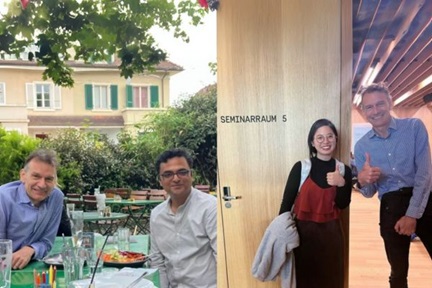Research Highlights: Interview With Assoc. Prof. Gianluca Esposito
1. Can you describe your role at NTU?
I am an Associate Professor in the School of Social Science (Psychology Program) and I have a joint appointment at Lee Kong Chian School of Medicine. Since 2014, I have been the head of the Social and Affective Neuroscience Lab, which is currently located on the NTU’s Novena campus.
2. Can you describe your academic journey leading to NTU?
I took my Ph.D. in 2006 at the University of Trento (Italy) and then I worked in the US (2007-2009) and Japan (2010) for post-doctoral research experiences. While in Japan,
I had my first experience as a young independent investigator (2011-2014) at the RIKEN Brain Science Institute (now called Center for Brain Science). During my stay in Japan, I was selected to take part, as a representative of RIKEN, in the Global
Youth Scientific Summit which was held in Singapore in 2013, and this was when I fell in love with Singapore.
3. What is your motivation for joining NTU?
After my participation at the Global Youth Scientific Summit, I was invited to participate in the call for the Nanyang Assistant Professorship scheme. After some years in a research-intense
institute, I was attracted to the idea of going back to academia and setting up my own research lab. NTU was a young, vibrant University with an already established position among the world’s top Universities. What I really liked from the beginning,
even more than the superb and super innovative facilities, was the friendliness, competence, and candor of both academic and administrative staff.
4. Can you describe your current research?
At the Social and Affective Neuroscience Lab, we apply a variety of physiological, genetic, neuroimaging, and behavioral protocols to better understand social and emotional processes among
humans (and sometimes animals). My current research focuses on europhysiological regulation during social interactions. As the lab is based in the multi-ethnic and multicultural nation of Singapore, one of our key research projects is in understanding
in- and out-group perception among different ethnic groups, depending on differently primed social contexts.
5. What is currently the hot topic in your research field?
In the field of social neuroscience, many up and coming research projects are making use of big data and data-driven approaches to uncover new patterns and findings in complex
neurological signals. These approaches are made possible with the development of new technology and better, faster processing software and hardware that allows us to understand our brain in ways that were previously not achievable.
6. What do you enjoy to do beyond your research?
I like spending time with Giada and Diana, my two daughters, and with Aurora, my wife. I am never tired of traveling and experiencing new cultures (and food). I also paint and play
the violin (but I would not say I am very successful in that).
/prof.-gianluca-and-his-daughtersd8e61d4b-207e-42da-bf09-beb2d6fee025.jpg?Status=Master&sfvrsn=3483c9e3_3)
List of Publications:
https://docs.google.com/document/pub?id=1hEyVewTqIh3-QM1qP5k2fVwnhSomCg7_SeF5T8Rf09Q
Selected Publications
- Azhari A, Azizan F, Esposito G. (2019). A systematic review of gut‐immune‐brain mechanisms in Autism Spectrum Disorder. Developmental Psychobiology.
- Pastore L., Dellantonio S., Mulatti C., Esposito G. (2019). To be or not to be emotionally aware and socially motivated: how alexithymia impacts autism spectrum disorders. Behavioral and Brain Sciences.
- Gabrieli G., Leck. W., Bizzego A., Esposito G. (2019). Are Praat's default settings optimal for Infant cry analysis?. Linux Audio Conference 2019, 83-88.
- Cataldo, I., Azhari, A., Coppola, A., Bornstein, M., Esposito, G. (2019). The influences of drug abuse on mother-infant interaction through the lens of biopsychosocial model of health and illness: a review. Frontiers in Public Health, 7(45).
- Esposito G. (2019). Trough the Specificity Lens: Comparative Physiology to Study Commonalities and Differences in Parent-Infant Interaction. Society for Research in Child Development (SRCD), 21–23 March 2019, Baltimore, Maryland, USA.

ca4d2bf9-0905-4231-8e52-674ddd25dcc2.tmb-listing.jpg?Culture=en&sfvrsn=24c71099_1)

edc9e8e3-cce8-4c19-b901-256c5190dff3.tmb-listing.jpg?Culture=en&sfvrsn=28c0a899_1)
88678a50-0e02-4e6f-a653-7d3352ab2c19.tmb-listing.jpg?Culture=en&sfvrsn=50a39a1e_1)
.tmb-listing.jpg?Culture=en&sfvrsn=7f15f9ca_1)
